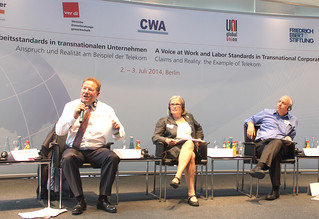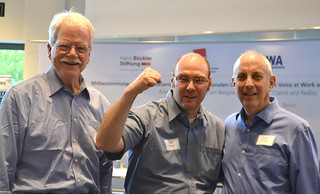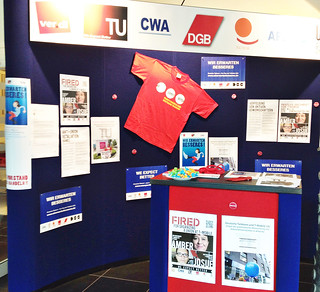Search News
For the Media
For media inquiries, call CWA Communications at 202-434-1168 or email comms@cwa-union.org. To read about CWA Members, Leadership or Industries, visit our About page.
Amazing Days in Berlin in the Fight for Workers' Rights at T-Mobile US
Germany Passes Historic Minimum Wage, Expands Bargaining Coverage
It was "several amazing days in our fight to gain workers' rights at T-Mobile," CWA President Larry Cohen said of the two-day meeting in Berlin that energized CWA and ver.di leaders and activists to push even harder to help T-Mobile US workers gain union representation and bargaining rights.
ver.di is the German union representing 2 million workers, including workers at T-Mobile and parent company Deutsche Telekom (DT).

Panelists Lothar Schröder (left), a leader of ver.di and Deputy Chairman of Supervisory Board at Deutsche Telekom; Christy Hoffman, UNI.Global Union; and CWA President Larry Cohen at Berlin conference on workers' rights.
Below: Cohen, a ver.di member and Rep. George Miller (left).

CWA President Larry Cohen joined ver.di and UNI leaders; 20 DT works council leaders from our TU partnerships; 20 DT workplace leaders from eastern and southern Europe; elected officials from the U.S. and the German Parliament (Bundestag) plus leading academics.
The focus was the global economy, trade and the behavior of multinational corporations, with T-Mobile US the main case. Another presentation was made by UAW President Bob King and a leader of IG Metall (the German metalworkers union) on Volkswagen and the organizing campaign in Chattanooga, Tenn. Rep. George Miller (D-CA), a House Democratic leader, discussed trade issues and union-busting at T-Mobile US.
Before the start of the meeting CWA presented petitions signed by 62,000 people in the U.S. – CWA members as well as activists from our partner groups – to the DT board, demanding neutrality in union representation campaigns in keeping with the stated principles of DT.
ver.di workplace leaders, who are retail store, call center and tech workers at DT and T-Mobile, built on this petition campaign, and will launch a massive petition drive in Germany, demanding that the German Parliament hold hearings on the failure of the government to support management neutrality in the U.S. or to take steps to stop U.S. management's "reign of terror" against T-Mobile US workers. In contrast, AT&T and Volkswagen are committed to full neutrality for workers regarding union representation. At least 50,000 signatures are needed to force the Bundestag hearing.
The ver.di workplace leaders also committed to deepening their connections and partnerships with thousands of T-Mobile US workers and finding new ways to encourage their U.S. counterparts in the partner sites to organize more effectively and courageously. These partnerships also will include CWA AT&T Mobility leaders and community activists.

Participants contrasted DT's human rights principles with the company's failure to enforce those principles at companies it own like T-Mobile US.
Cohen and leaders from ver.di also discussed the proposed trade partnership between the U.S. and Europe (the Trans-Atlantic Trade and Investment Partnership) with a focus on eliminating the corporate tribunals and the extra rights that are given to corporations and investors to challenge a nation's laws in secret arbitrations.
The Trans-Pacific Partnership provides these super rights and protections for corporations; CWA and allies are determined to block this attack on the rights of any nation to act in the interest of its people.
Rep. Miller engaged with many members of the German Parliament on trade issues, particularly these investor state concerns, as well as how legislators can support workers' rights at T-Mobile US.
In an historic action during the conference, the German Parliament adopted Germany's first-ever minimum wage legislation, at a rate equal to $11.60 U.S., and improved collective bargaining rights for millions of workers. The result: now some 80 percent of German workers will have collective bargaining rights, as compared to 12 percent for U.S. workers.
The new law also encourages collective bargaining for agricultural, personal care workers and others who have not had collective bargaining for decades.
What is amazing to us in the U.S., Cohen said, is that the legislation passed unanimously, by conservatives, labor and greens, with a few abstentions.